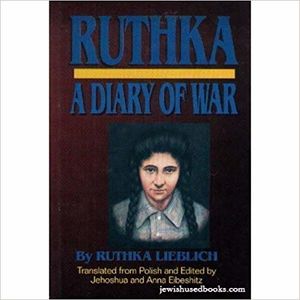Ruthka: A Diary of War (1993 Lieblich), book
Ruthka: A Diary of War (1993) is the English edition of a diary written in Polish by Holocaust victim Ruthka Lieblich (1926-1942) at age 13 to 16, when living in a Polish village under Nazi occupation.
Abstract
""This is the journal of Ruthka Lieblich, a Polish Jew from World War II. She wrote in her diary from age 13 to age 16, at which time she was deported to Auschwitz and gassed. A gentile friend kept the diary after the war and it wound up being published. Ruthka had obvious literary talent and wrote short stories and poetry. She wrote her diary in Polish and occasionally in Hebrew, and she tried her hand at English too. At the beginning of the book there's a translator's preface, an editor's preface and an introduction to add context to the story. You learn about some of the people Ruthka mentions in her diary, and about the fate of her hometown, which was situated not far from Auschwitz. Of the 300 Jewish people living in the village of Andrichow, only 25 survived the war. Two of Ruthka's cousins survived; the rest of her family was killed. At the end of the book there are some letters Ruthka wrote to her friends, as well as her surviving cousins' descriptions of her. She apparently had a chance to go into hiding, but she refused because she didn't want to be separated from her family. Although the subheading is "A Diary of War," I think that's a misnomer. You can almost forget that Ruthka is writing all this in Nazi Europe. She only occasionally mentions the war and Hitler and the persecution of the Jews. Instead, Ruthka concentrates on her relationships with her friends, reflections on what it means to be a Jew, her desire to move to Palestine, and questions about God. She became more intensely religious as the diary went on, although she seems to have remained an "assimilated" (rather than Orthodox or Hassidic) Jew. I think Ruthka's diary has earned its place among the other young people's Holocaust diaries. It would probably be a good companion to the diary of Moshe Flinker, another very religious Jew in Nazi Europe."--Publisher description.
Editions
Published in Brooklyn, NY: Remember, 1993.
